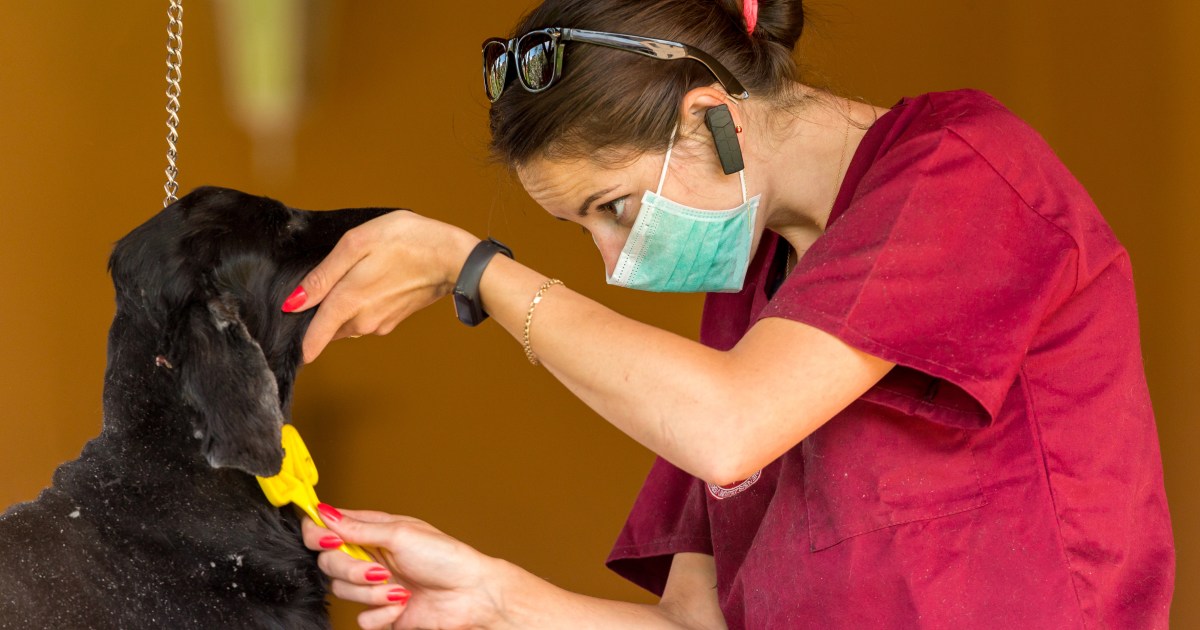A report published by the French newspaper, Le Parisien, discussed the role that veterinarians could play in facing the emerging corona virus epidemic, at a time when Danish Prime Minister Matte Frederiksen said Wednesday that her country will cull up to 17 million animals from you (Mink), after Mutation of the Corona virus that was discovered in animals and transmitted to humans.
Fredricksen added - according to Reuters - that health authorities had found strains of the virus in humans and in mink, which showed a decrease in sensitivity to antibodies, which may reduce the effectiveness of future vaccines.
"We have a huge responsibility towards our people, but with the change that has now been discovered, we have a greater responsibility towards the rest of the world as well," she said.
And she added, "The mutated virus in the mink may pose a risk to the effectiveness of the future vaccine. This means the risk of its possible spread from Denmark to other countries."
The results, which were reported to the World Health Organization and the European Center for Disease Control and Prevention, were based on laboratory experiments conducted by the Danish Serum Institute, the Danish body authorized to deal with infectious diseases.
The outbreak continued on mink farms in Denmark, the world's largest producer of mink fur, despite repeated calls to cull infected animals since June.
Frederiksen said police, army and home guards would be deployed to speed up the execution.
Veterinarians
So far, veterinarians have only been used on a very small scale in the midst of the emerging corona virus pandemic that causes "Covid-19", despite their deep knowledge of this type of viruses and their experience in dealing with crises and epidemics.
In a report published in the French newspaper "Le Parisien", writer Emily Tourjimin says that what we overlook today is that veterinarians have known a lot about the various viral groups for decades, and they are facing new epidemics every 5 years, and despite this the role that can be ignored is They are undertaking it in the face of the emerging corona virus, which is a virus of primarily animal origin.
In this context, the deputy in the French Parliament for the "Republic Forward" party, the veterinarian specializing in dogs and cats, Luc Dombreval, had sent a letter to the President of the Republic, Emmanuel Macron, proposing the appointment of a veterinarian in the "Scientific Council Covid-19", which was It was formed in March to fight the pandemic.
According to the letter, Dumbreval does not personally nominate himself for this position, but rather requests the appointment of a highly qualified specialist who supports scientific research in this field.
Rep. Dompreval affirms that the veterinarian was "excluded" from the crisis management cell in France from the beginning, unlike Germany or China, where veterinarians play a pivotal role in fighting the epidemic.
Jean-Luc Anjou, president of the French Veterinary Academy, believes that the exclusion of the veterinarian in the midst of the pandemic is an understatement of veterinary medicine compared to human medicine.
"Some people still believe that veterinarians enter the laboratories with their large shoes stained with mud, while the safety procedures in veterinary laboratories are in conformity with the standards approved in other medical laboratories," he said.
Epidemiological management in veterinary medicine
The author says that veterinarians deal daily with different types of corona viruses that live in the bodies of animals such as dogs, cats and pigs, and they have devised vaccines against each other, similar to infectious bronchitis in poultry.
Anjou stresses that there is a difference in the approach taken to deal with viruses between veterinary medicine and human medicine, as veterinarians "manage groups or items infected within the herd, but human medicine focuses on the individual."
For his part, Patrice Gauthier - an expert at the World Organization for Animal Health - says, "Veterinary medicine has become very experienced in crisis management, as it faces a major crisis every 5 years and is always on alert."
He adds that the world organization is currently preparing for swine fever and bird flu.
Among the procedures followed in the event that any animal breeder suspects the presence of injuries in his herd, to inform the veterinary authorities that ensure the spread of any infectious diseases, and then surround the farm, disinfect the area and prevent any friction within 10 kilometers.
Gauthier believes that dealing with epidemics at the level of human medicine is completely different, as "the Ministry of Health and health departments in the various regions of the country know very well how to supervise care activities, not to manage crises, because they have not faced such crises."

